
Visual Computing for Industry Biomedicine and Art
Scope & Guideline
Bridging Technology and Creativity in Visual Computing
Introduction
Aims and Scopes
- Biomedical Imaging and Analysis:
The journal emphasizes the application of visual computing in medical imaging, including techniques such as computed tomography, magnetic resonance imaging, and ultrasound, to enhance diagnostic accuracy and treatment planning. - Machine Learning and AI Integration:
A significant focus is placed on integrating machine learning and artificial intelligence with visual computing to develop advanced algorithms for image classification, segmentation, and analysis in healthcare and industrial settings. - Industrial Applications of Visual Computing:
The journal explores the use of visual computing techniques for optimizing industrial processes, including automation, defect detection, and 3D reconstruction, promoting efficiency and innovation in manufacturing. - Art and Aesthetic Computing:
There is a unique contribution towards the exploration of visual computing in the arts, including the development of tools and methods for visual analysis and the creation of digital art. - Interdisciplinary Research:
The journal encourages interdisciplinary studies that combine computer science, engineering, medicine, and the arts, fostering collaboration among researchers from diverse fields.
Trending and Emerging
- Advanced Machine Learning Techniques:
There is an increasing focus on sophisticated machine learning methodologies, such as deep learning and reinforcement learning, particularly in medical imaging and industrial applications, reflecting the growing impact of AI. - Radiomics and Predictive Analytics in Healthcare:
The integration of radiomics with predictive analytics for patient outcomes is becoming more prominent, showcasing the importance of data-driven approaches in personalized medicine. - Interactivity and Real-Time Processing:
Emerging research is exploring interactive visual computing methods that allow real-time data processing and visualization, which is essential for applications in surgery and dynamic industrial environments. - Digital Twins and Simulation Technologies:
The concept of digital twins is gaining attention, with studies focusing on their application in monitoring and optimizing industrial processes, indicating a shift towards more integrated and real-time systems. - Augmented and Virtual Reality Applications:
There is a growing interest in the use of augmented and virtual reality for training, education, and therapeutic applications, reflecting a trend towards immersive technologies in various fields.
Declining or Waning
- Traditional Image Processing Techniques:
There is a noticeable decrease in the publication of papers focused solely on traditional image processing methods, as the field shifts towards more advanced techniques involving machine learning and AI. - General Surveys without Novel Contributions:
Papers that provide broad surveys of existing technologies or methods without introducing innovative approaches are becoming less frequent, indicating a preference for novel research and applications. - Basic Computational Theories:
Research focusing solely on foundational computational theories without practical applications in visual computing has seen a decline, as the journal prioritizes applied and interdisciplinary research.
Similar Journals
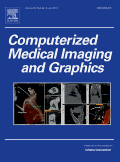
COMPUTERIZED MEDICAL IMAGING AND GRAPHICS
Exploring Cutting-edge Research in Medical Imaging and GraphicsCOMPUTERIZED MEDICAL IMAGING AND GRAPHICS, published by PERGAMON-ELSEVIER SCIENCE LTD, is a leading international journal that has significantly contributed to the fields of medical imaging, graphics, and informatics since its establishment in 1988. With a remarkable reputation reflected in its Q1 quartile rankings across multiple categories—including Computer Graphics, Health Informatics, and Radiology—this journal maintains a prominent position in the academic community, evidenced by its Scopus rankings where it ranks in the top percentile across various disciplines. The journal aims to advance knowledge and innovation within the intersection of technology and healthcare, featuring high-quality research that addresses contemporary challenges in medical imaging and graphical methodologies. With no open access options currently available, this journal serves as a crucial resource for researchers, professionals, and students who are at the forefront of advancing imaging technology and its applications in medicine.

Journal of Imaging
Empowering Researchers with Open-Access Imaging InsightsThe Journal of Imaging, published by MDPI, is an esteemed open-access journal dedicated to advancing the fields of Computer Graphics, Computer Vision, and Electrical Engineering. Since its inception in 2015, this journal has established a significant presence in the academic community, reflected by its impressive rankings in Scopus, including a Q2 quartile in multiple categories such as Computer Vision and Pattern Recognition and Radiology. With a commitment to disseminating high-quality research, the journal offers a platform for innovative studies and practical applications, making it an essential resource for researchers, professionals, and students alike. Operating from its base in Basel, Switzerland, the journal continues to promote scholarly work that pushes the boundaries of imaging technologies, while contributing to the global discourse in its respective fields. The open-access model ensures that valuable research is readily available, fostering collaboration and knowledge-sharing across disciplines.

JOURNAL OF VISUALIZATION
Empowering research with innovative visual techniques.JOURNAL OF VISUALIZATION, published by Springer, is a pioneering platform dedicated to advancing the fields of condensed matter physics, electrical and electronic engineering, and computer graphics through innovative visualization techniques. With an ISSN of 1343-8875 and an E-ISSN of 1875-8975, this esteemed journal has been an essential resource since its inception in 1998, and continues to shape the landscape of visualization research, boasting a Q2 ranking in key academic categories as of 2023. The journal's commitment to high-quality research is reflected in its Scopus rankings, where it stands at #47 in Computer Graphics and Computer-Aided Design, #388 in Electrical Engineering, and #222 in Condensed Matter Physics. While the journal subscribes to a traditional access model, it remains a critical outlet for researchers and professionals seeking to disseminate their findings amidst evolving technological and scientific paradigms. Situated in Germany, the JOURNAL OF VISUALIZATION encompasses a diverse array of articles that not only highlight theoretical advances but also practical applications, making it a vital resource for anyone engaged in the confluence of visual analytics and technology.
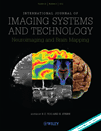
INTERNATIONAL JOURNAL OF IMAGING SYSTEMS AND TECHNOLOGY
Bridging Disciplines through Cutting-Edge Imaging ResearchINTERNATIONAL JOURNAL OF IMAGING SYSTEMS AND TECHNOLOGY, published by Wiley, is a leading journal dedicated to advancing the field of imaging systems and technologies. With an ISSN of 0899-9457 and E-ISSN 1098-1098, this esteemed journal offers a platform for high-quality research spanning essential interdisciplinary areas, including Biomedical Engineering, Computer Science, and Health Informatics. Recognized for its impactful contributions, it holds a commendable position in the Q2 quartile across multiple categories as of 2023. The journal boasts an excellent Scopus ranking, with notable acknowledgments like rank #49 out of 333 in Radiology, Nuclear Medicine, and Imaging, showcasing its relevance and importance in the academic community. Publishes annually from 1989 to 2024, it aims to bridge gaps in knowledge and foster innovative developments through rigorous peer-reviewed articles. Though it operates under a traditional access model, the journal maintains an accessible repository of cutting-edge research, making it indispensable for researchers, professionals, and students alike seeking to stay at the forefront of imaging technology advancements.
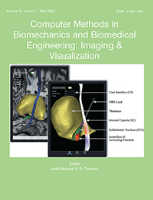
Computer Methods in Biomechanics and Biomedical Engineering-Imaging and Visualization
Exploring Computational Frontiers in Biomedical EngineeringComputer Methods in Biomechanics and Biomedical Engineering - Imaging and Visualization is a prominent academic journal published by Taylor & Francis Ltd, dedicated to the intersection of computational methods and biomedical engineering. With an ISSN of 2168-1163 and an E-ISSN of 2168-1171, the journal has become a crucial resource for researchers and professionals exploring innovative imaging and visualization techniques in healthcare. Covering a broad spectrum of topics, it aims to facilitate the advancement of knowledge in areas such as biomechanics, computational mechanics, and medical imaging. Holding a strong position in various Scopus rankings, including Q2 in Computational Mechanics, it offers valuable insights that foster interdisciplinary collaboration. Although it is not an open-access journal, researchers can access its rich repository of knowledge, which is instrumental in shaping future advancements in biomedical applications. The journal’s commitment to quality and relevance ensures that it remains an authoritative source for emerging trends and methodologies within the field, serving as a vital tool for academia and industry practitioners alike.

VISUAL COMPUTER
Exploring the Intersection of Art and TechnologyVISUAL COMPUTER is a prestigious journal published by Springer, focusing on the dynamic fields of computer graphics, computer-aided design, computer vision, and software. Established in 1985, this interdisciplinary journal serves as a vital platform for sharing innovative research, applications, and developments crucial to the advancement of visual computing technologies. With a notable Q2 ranking in various categories, including Computer Graphics and Computer-Aided Design, and Computer Vision and Pattern Recognition, VISUAL COMPUTER demonstrates a solid impact within the academic community, marked by its Scopus rankings that reflect its significant contributions to the field. While the journal does not offer open access, it remains a reliable source of high-quality content for researchers, professionals, and students eager to stay abreast of emerging trends and techniques, ultimately fostering collaboration and knowledge exchange within the rapidly evolving landscape of visual computing.

International Journal of Design
Pioneering New Horizons in Design ApplicationsThe International Journal of Design, published by National Taiwan University of Science and Technology, is a premier open-access journal that has been contributing to the field since 2007. With an ISSN of 1991-3761 and E-ISSN of 1994-036X, this journal focuses on the interdisciplinary nature of design and its applications across various domains including Computer Graphics, Industrial and Manufacturing Engineering, as well as Visual Arts. The journal has consistently achieved high rankings, including being placed in the top quartile (Q1) for several categories in 2023, reflecting its significance in academia and its impact on contemporary design research. Offering wide-ranging access options, the International Journal of Design serves as a valuable resource for researchers, professionals, and students looking to explore innovative design practices and theories. With its scope spanning both artistic and industrial applications, this journal is dedicated to fostering advancements in design and providing a platform for scholarly discussions that bridge the gap between theory and practice.
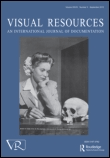
Visual Resources
Transforming Perspectives on Visual CultureVisual Resources, an esteemed journal published by Routledge Journals, Taylor & Francis Ltd, serves as a vital platform for scholarly research in the fields of Museology and Visual Arts and Performing Arts. With an ISSN of 0197-3762 and an E-ISSN of 1477-2809, this journal has navigated the academic landscape since its inception in 1980, continuing to amplify critical dialogues up to 2024. Positioning itself within category quartiles as Q3 for both museology and visual arts, the journal ranks at #302/667 in the Visual Arts and Performing Arts category and #41/83 in Museology according to Scopus, reflecting a significant yet competitive standing. Although not designated as Open Access, the publication remains accessible through institutional subscriptions, catering to a diverse audience of researchers, professionals, and students. By disseminating pioneering research and innovative methodologies pertinent to visual culture and museum practices, Visual Resources plays an indispensable role in advancing knowledge in its disciplines and connects academia with contemporary practice.
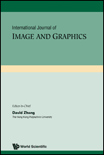
International Journal of Image and Graphics
Exploring the Intersection of Art and TechnologyInternational Journal of Image and Graphics, published by World Scientific Publishing Co. Pte Ltd, serves as an essential platform for scholars and practitioners in the realms of Computer Graphics, Computer-Aided Design, and Computer Vision and Pattern Recognition. Established in 2001 and based in Singapore, this journal has become increasingly influential, with a reputation reflected in its Q3 and Q4 rankings across key categories in Scopus, highlighting its growing impact in the academic community. Open access options remain limited; however, the journal's commitment to disseminating high-quality research allows for a rich exchange of ideas among professionals and students alike. As the 2023 metrics indicate, contributions to the journal not only enhance individual academic portfolios but also promote advancements in image processing, fostering innovation and growth within the discipline until at least 2024. It is thus a vital resource for anyone looking to deepen their knowledge and understanding of contemporary trends and technologies in image processing and related fields.
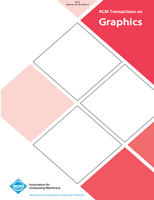
ACM TRANSACTIONS ON GRAPHICS
Pioneering Research in Visual ComputingACM Transactions on Graphics, a premier journal published by the Association for Computing Machinery, stands at the forefront of research in the field of computer graphics and computer-aided design. With its ISSN 0730-0301 and E-ISSN 1557-7368, this highly respected publication has maintained a stellar reputation since its inception in 1982, showcasing groundbreaking work that spans the latest innovations and applications in graphics technology. Ranked within the top tier (Q1) of its category in 2023 and occupying the 5th position out of 106 in the Scopus rankings, this journal holds a significant impact factor, reflecting its critical role in advancing knowledge and fostering collaboration among researchers, professionals, and students alike. Although it does not offer open access options, the journal provides a diverse array of scholarly articles aimed at delineating theoretical advances, practical techniques, and emerging trends within the discipline, ensuring that its readership remains at the cutting edge of the evolving landscape of digital graphics.